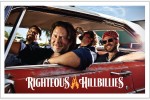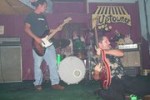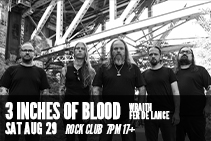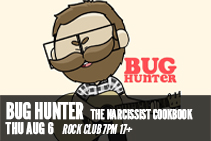
THE QUEERS

THE QUILTS
Cultured
THE RAILJACKS
THE RAMORES
THE RANDIES
THE RE-ANIMATORS
THE REAL CHRISTS
THE RED BUTTONS

THE RED CHORD
The Red Chord is an American deathcore band from Revere, Massachusetts, formed in 1999. The group comprises vocalist Guy Kozowyk, guitarist/vocalist Mike “Gunface” McKenzie, bassist Greg Weeks and drummer Jon Rice. The band gained a fanbase with its 2002 debut album Fused Together in Revolving Doors.
THE RED JUMPSUIT APPARATUS
THE RED LINE
THE RED PEACE
THE RED PLASTIC BUDDAH
THE REDLINE DISTRICT
THE REGALS
THE REGRETS
THE REGULARS
THE REID KARRIS PROJECT

THE REIGN OF KINDO
The Reign Of Kindo has become one of the most unlikely phenomenons to infiltrate the modern music world. Almost ten years since their debut EP hit #5 on the Billboard Middle Atlantic Heatseekers chart in 2007 , this band has only just begun to emerge from their decade long journey from rags to… better rags…with resumes. In an industry where big money and privilege can buy you radio play, TV appearances and audience, TROK managed to rack up over 3 million views on youtube, over 2.5 Million Spotify plays, & Sell over 30,000 records across the globe, all without the help of any major label. It has become evident, theirs is the sort of sound that so many music lovers are eager to discover and enjoy.
THE REMEMBERWHENS

THE RENEGADES
THE RENEGADES are a Chicago-based jazz-fusion group featuring Paul Mutzabaugh (keyboards), Frank Alongi (drums), Tim Seisser (bass), and Chris Siebold (guitar). Their all-original repertoire employs odd-time signatures, jazz harmony, complex arrangements, and improvisation. Drawing on diverse musical influences, The Renegades offer a wide variety of fusion music… accessible and enjoyable to both musicians and non-musicians alike. More information can be found at www.paulmutzabaugh.com/therenegades.

THE REPELLENTS
South Side Pop Punk from Blue Island,Il. Started in 1997 and brought back from the dead in 2019. Drinking, sing alongs, and high fives is our motto. See you at the shows. Gus, Brad,Box,Pete.
THE RESISTORS
THE RESTARTS
THE REVISION PLAN
THE REWRITES
THE RICK WEEDS BAND
THE RIGHT COAST

THE RIGHTOUS HILLBILLIES
Brent James (vocals & rythyhm guitar), Kev Wright (vocals & lead guitar), Johnny Gadeikis (bass guitar) and Barret Harvey (drums and percussion), are four talented, unique, and powerful individuals coalesce to create The Righteous Hillbillies. The Righteous Hillbillies are an axe shredding, ace dealing, foot stompin’, Southern rock, high-powered Ameicana, boogie blues band that plays with talent and passion. They have built a strong, supportive, and loyal following throughout their hometown of Joliet, Illinois and into the Chicago area. The Righteous Hillbillies baptize their work in the blood of Lynyrd Skynyrd, AC/DC, ZZ Top, and the Black Crowes while still managing to create an original and independent style. With their dynamic and fiery new album, Trece Diablos, The Righteous Hillbillies are prepared to raise the stakes from entertainment to that old time rock ‘n’ roll religion. If it doesn’t get you dancing, moving, and singing, you might as well sign your “do not resuscitate” order at the nearest opportunity.
THE RIKTERS
THE RIOT
THE RIVER RAID
THE RIVERBILLY COUSIN TOUCHERS

THE OCEAN
Right off the back of a 6 months world tour, the Berlin-based atmospheric post metal juggernaut The Ocean (Collective) returns with the follow-up to their critically acclaimed Phanerozoic double album. Holocene sees The Ocean add a closing chapter to their palaeontology-inspired album series, presenting a gear shift towards the electronic world while redefining heaviness at the same time. With Holocene The Ocean draw us into their momentum of truly forward-thinking music and relentless live performances. More than 20 years into their career, this Berlin-based collective still shake us to the core, inviting us to reconsider our lives from different angles. Dwelling in the depths of our inner contemplations, while looking up, we can see the light at the surface. A light we might have taken for granted for so long, but of which The Ocean show us a rare glimpse of perspective. Holocene unites the might of this massive act’s past and present, while creating a deeper understanding of their world as well as ours in the process.
THE OMEGAS
THE OPUS
THE OTIS PROBLEM
THE OUTBREAKS
THE P1 MOVE
THE PANTONE TRIO
THE PARAMEDICS
THE PARISH FESTIVAL
THE PARTY DOWNERS
THE PAWNS
THE PEAR TRAPS
THE PELTS
THE PERIOD.
THE PHENOMENAUTS
THE PHENOMS
THE PICKPOCKETS
THE PIN-UPS
THE PINK LIPSTICKS
THE PINK SPIDERS
THE PLASTIC CONSTELLATIONS
THE PLEASE & THANK YOUS
THE PLEASURE KILLS
THE POLKAHOLICS
THE POLYMER TWINS

THE PORN AGAIN CHRISTIANS
After years honing their craft in bands such as Swampass, The Porn Again Christians, Soy City Stranglers, Pork Chop Shifter, among others, MALT LIQUOR was forged in 2012 out of pure Rock ‘n’ Roll! These boys have collectively opened for such monsters as Iggy Pop, Fu Manchu, GWAR, Misfits, Nashville Pussy, Zeke, Supersuckers etc. As rock spewed forth from the three men in the band at all times, it only made sense they combine forces for the ultimate rock ‘n’ cock ‘n’ roll machine! They combine the cock rock of their forefathers such as The Stooges, The Dwarves, The Hellacopters, et al, with their own blend of white boy blues thrash. Recordings are in the very near future, but for now ya gotta catch ’em live!
THE POSITIVES
THE POUSETTE-DART BAND
THE POW WOWS
THE POWERCHORDS
THE PRALINES

THE PREP SCHOOL TRAGEDY
Armed with enough adrenaline to rival any current touring act, The Prep School Tragedy have quickly broke out as one of Chicago’s premier Industrial/Alternative collectives. Led by two front men, Benn “TranQ” Guy and Michael “Ignited” Hodes, the band has become notorious for its controversial live performances that include scantily clad cheerleaders, known only as The Squad. Rebelling against main
THE PRIMERIDIAN
THE NERVE SCHEME
THE NEUTRON BOMBS

THE NEW DIET
meat sweats
THE NEW MESSENGERS
THE NEW UP
THE NIGHT BRIGADE
THE NIGHTBEAST

THE NIX
The western-tinged metal cousin of At The Drive-In.
THE NOBBS
THE NOIR DOLLS
THE NOISE FM
THE NOMINEES ARE
THE NON-BELIEVERS
THE NOTHINGHEADS
THE NOVEL IDEAS
THE NUMBER 12 LOOKS LIKE YOU
THE NUMBERS

THE O’MY’S
The O’My’s are the new sound of Chicago Soul. Rising stars in the midst of a Chicago music and cultural renaissance, The O’My’s have recorded and shared stages with Chance the Rapper, Wyclef Jean, ZZ Ward, Ab Soul, Twista, NoName Gypsy, Mick Jenkins, Save Money, Yo Yo Ma, and Kids These Days. A multi instrument, multi-ethnic crew, The O’My’s are led by co-founders and songwriters, singer/guitarist Maceo Haymes and keyboardist Nick Hennessey. The crew’s rhythm section is comprised of bassist Boyang Matsapola and drummer Barron Golden. Erick Mateo on sax, William Miller on trumpet, and J.P. Floyd (formerly of Kids These Days) on trombone complete the horn section. All Chicago natives, The O’My’s sound captures the tremendous love, pain, warmth and bitter cold found in the city’s streets. Delicate arrangements, a pounding rhythm section and soaring horns provide a perfect home for Haymes’ commanding, smokey rasp and smooth falsettos. Drawing from Chicago’s rich musical traditions of blues, jazz and rock, The O’My’s pick up where their musical forefathers left off, taking Roots Rock’n’Soul to the present. The O’My’s are now in studio recording their third project, Keeping the Faith, a Psychedelic Soul record slated for release in the late fall of 2014.
THE OBSTACLES
THE MENZINGERS
THE METAPUFFS

THE METHADONES
A good band name always gives the potential listener some idea what sort of music to expect. (Bad band names are ones that mess with those expectations: a certain artsy-jangly guitar pop band of the early ’90s would have been much more successful had they not been called , which sounds like the name of a scabrous hardcore act.) Chicago-based pop-punk band the Methadones is an excellent case in point: methadone — not to be confused with methamphetamine, aka crystal meth — being the drug prescribed to recovering heroin addicts who are attempting to get clean through a rehab-type regimen, the listener immediately expects world-weary, sadder but wiser punk rock, perhaps with a rootsy edge, not unlike the best of or . The Methadones deliver in full on that promise, but also add a bubblegummy power pop side to their music that makes them equally attractive to fans of the post- cadres of mall punk bands.














